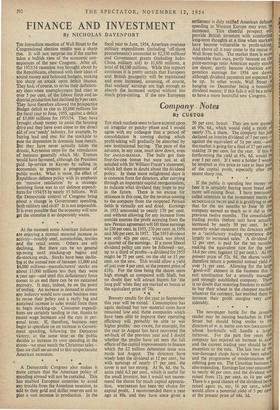Company . Notes
By CUSTOS
THE stock markets seem to have entered upon an irregular or patchy phase and I would agree with my colleague that a period of consolidation is coming during which profit-taking will gradually be absorbed by new institutional buying. The pace of the advance, in any case, must slow down, even for ANGLO-IRANIAN. The bulls got their four-for-one bonus but were not at all satisfied with Sir William Fraser's statement, which left them in doubt about the dividend policy. In these more enlightened days it is common form for directors, after carrying through an important capital reorganisation, to indicate what dividend they hope to pay in the future. There is no excuse for reticence in this case, for the revenue coming to the company from the reopened Persian fields is virtually cut and dried. Earnings in 1953 amounted to nearly 170 per cent. and without allowing for any increase from outside sources the profit accruing from the new Persian agreement will lift these earnings to 230 percent. in 1955, 270 per cent. in 1956 and 300 percent. in 1957. The 1953 dividend was only 421 per cent., which was about a quarter of the earnings. If a more liberal dividend policy can now be followed—say, up to a third of profits—a dividend for 1955 might be 75 per cent. on the old or 15 per cent, on the new. This would allow a yield of just over 4 per cent. at the present price of £181. For the time being the shares seem high enough as compared with Shell, but no doubt they will attract buyers for the long pull' when they are marked ex bonus at the equivalent price of 74s.
*
Brewery results for the year to September this year will be mixed. Consumption has again declined but raw material costs have remained low and thrift companies which have been able to improve their operating efficiency will probably be able to win higher profits: IND COOPE, for example, for the year to August last have recovered the set-back of the previous year and I doubt whether the profits have yet seen the full effects of the capital improvements to finance which the £2 million debenture issue was made last August. The directors have wisely kept the dividend at 12 per cent., for with earnings of nearly 17 per cent. the cover is not too strong. At 9s. 6d. the 5s. units yield 6.2 per cent., which is useful for the small investor, but I would not recom- mend the shares for much capital apprecia- tion. WHITBREAD has been my choice for capital profit. I recommended them a year ago at 88s. and they have since given a 50 per cent. bonus. They are now quoted at 95s. 6d., which would yiel4 a profit of nearly 37s. a share. The company has just declared an interim dividend of 7 per cent.--, • against the equivalent of 51 per dent.—and the market is going for a final of 17 per cent., making 24 per cent. for the year. If this is forthcoming the yield at 95s. 6d. would bd over 5 per cent. If I were a holder I would be tempted at this price to take at least pall of the capital profit, especially after the recent sharp rise. • If the public is spending less money on beer it is certainly buying more bread and more self-raising flour. I have previouslY, called attention to the investment merits 01 MCDOUGALLS TRUST and it is gratifying to sed that for the ten months to June 30 this company earned as much as it did in the previous twelve months. The consolidated trading profits (before tax) have actually increased by nearly 50 per cent. In a masterly under-statement the directors refer to a 'satisfactory trading experience dud, largely to increased sales.' A dividend 01 12 per cent, is paid for the ten months, making the equivalent rate for the yea 14.4 per cent. (against 12 per cent.). At die present price of 52s. 9d. the shares would,. therefore return a potential annual yield 0' over 51 per cent. Allowing for the large 'good-will' element in the business this not unattractive for a soundly manage° and strongly established company. There is no doubt that restoring freedom to to buy their wheat in the cheapest market, whatever the currency, has enabled them to increase their profit margins very coo' siderably.
The newspaper battle for the juvenild reader may be causing headaches in Heel Street but should bring smiles to tile directors of W. H. SMITH AND SON (HOLDIN(." whose bookstalls will handle a larger turnover. For the past five years this company has enjoyed an increase in sales and the current trading year should be exception to the rule. The last two of tle, war-damaged shops have now been rebuts,' and the programme of modernisation an° refitting goes on. The Canadia,n business i! also expanding. Earnings last year amounteo to nearly 40 per cent, and the dividend wa,s raised from 121 per cent. to 14 per ceni• There is a good chance of the dividend beillf raised again to, say, 16 per cent., whic" would allow a potential yield of 5 per cent' at the present price of 64s. 3d.


































 Previous page
Previous page